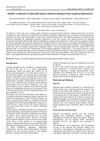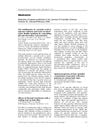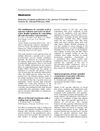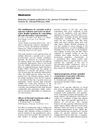
Caffeine can potentially treat common hair loss by counteracting hair follicle shrinkage caused by hormones.
 1 citations,
July 2022 in “Journal of Drug Delivery Science and Technology”
1 citations,
July 2022 in “Journal of Drug Delivery Science and Technology” Niosomes and ethosomes can effectively carry the drug spironolactone, potentially improving treatment for hair loss and reducing side effects.
 November 2023 in “International Journal of Pharmaceutics”
November 2023 in “International Journal of Pharmaceutics” The new delivery system improves treatment for hair loss by enhancing drug absorption and effectiveness.
36 citations,
July 2017 in “Journal of controlled release” A new method allows for controlled, long-lasting delivery of retinoic acid through the skin with fewer side effects.
 19 citations,
May 2021 in “Clinical, Cosmetic and Investigational Dermatology”
19 citations,
May 2021 in “Clinical, Cosmetic and Investigational Dermatology” Minoxidil and finasteride are the best for non-scarring hair loss; more research is needed for scarring hair loss treatments.
1 citations,
February 2024 in “Pharmaceutics” Nanovesicles improve drug delivery through the skin, offering better treatment outcomes and fewer side effects.
 1 citations,
April 2023 in “Biomolecules”
1 citations,
April 2023 in “Biomolecules” Fermented papaya and mangosteen in hair care products helped prevent hair loss and improve hair thickness.
 August 2024 in “Cosmetics”
August 2024 in “Cosmetics” Caffeine is beneficial for skin and hair treatments but needs better delivery methods to penetrate deeper skin layers.
 January 2024 in “JOJ Dermatology & Cosmetics”
January 2024 in “JOJ Dermatology & Cosmetics” TH07 treatment is promising for hair growth, with higher satisfaction in males.
 July 2023 in “Journal of exploratory research in pharmacology”
July 2023 in “Journal of exploratory research in pharmacology” A new psoriasis lotion called "Psorisbye" improved symptoms in a patient within one week.
Nanotechnology shows promise for better hair loss treatments but needs more research for safety and effectiveness.
 2 citations,
January 2023 in “BioMed Research International”
2 citations,
January 2023 in “BioMed Research International” Beetroot extract nanogel may help treat hair loss caused by testosterone.
 November 2024 in “Pharmaceutics”
November 2024 in “Pharmaceutics” Transfersomes are better than liposomes for targeting hair follicles in alopecia treatment.
 December 2019 in “Drug Analytical Research”
December 2019 in “Drug Analytical Research” Magistral pharmacies had issues with production quality and dosage accuracy.
4 citations,
May 2013 in “PubMed” Minoxidil in Espumil foam stays stable for at least 90 days at room temperature.
 2 citations,
October 2020 in “Dermatologic Therapy”
2 citations,
October 2020 in “Dermatologic Therapy” Herbal solution improves hair diameter and density more than 5% minoxidil for androgenetic alopecia.
 44 citations,
October 1989 in “International Journal of Pharmaceutics”
44 citations,
October 1989 in “International Journal of Pharmaceutics” Minoxidil's effectiveness decreases as vehicle evaporates; concentration and thermodynamic activity matter.
 118 citations,
July 2005 in “Journal of Ethnopharmacology”
118 citations,
July 2005 in “Journal of Ethnopharmacology” Eclipta alba extract improved learning, memory, and stress-related ulcers in rats without affecting movement or causing anxiety.
 233 citations,
February 2018 in “Polymers”
233 citations,
February 2018 in “Polymers” Chitin and chitosan are useful in cosmetics for oral care, haircare, and skincare, including UV protection and strength improvement.
 6 citations,
January 2016 in “Springer eBooks”
6 citations,
January 2016 in “Springer eBooks” Invasomes effectively deliver drugs through the skin and have potential for improved treatments.
 December 2024 in “Journal of Population Therapeutics and Clinical Pharmacology”
December 2024 in “Journal of Population Therapeutics and Clinical Pharmacology” Rosemary and kalonji seeds can improve hair health and treat hair conditions.
 22 citations,
July 2004 in “International Journal of Cosmetic Science”
22 citations,
July 2004 in “International Journal of Cosmetic Science” UV radiation and visible light can damage hair, but there are ways to protect it.
 11 citations,
July 2004 in “International Journal of Cosmetic Science”
11 citations,
July 2004 in “International Journal of Cosmetic Science” The conclusion is that a new method to measure hair shine was confirmed to match people's visual assessments.
 7 citations,
July 2004 in “International Journal of Cosmetic Science”
7 citations,
July 2004 in “International Journal of Cosmetic Science” Different hair types from various ethnic groups affect hair shine due to characteristics like thickness and shape.

Pimpinella anisum L. extract significantly boosts hair growth in mice.
 142 citations,
August 2007 in “Journal of The American Academy of Dermatology”
142 citations,
August 2007 in “Journal of The American Academy of Dermatology” New 5% minoxidil foam effectively promotes hair growth and is safe for use.
 47 citations,
April 2017 in “European Journal of Pharmaceutics and Biopharmaceutics”
47 citations,
April 2017 in “European Journal of Pharmaceutics and Biopharmaceutics” The new dutasteride formula can be applied to the skin, may promote hair growth, and has fewer side effects.
 44 citations,
March 2020 in “Antibiotics”
44 citations,
March 2020 in “Antibiotics” Rosemary extracts with carnosic acid and carnosol can reduce the harmfulness of Staphylococcus aureus without stopping its growth.
 25 citations,
July 2017 in “Archives of Dermatological Research”
25 citations,
July 2017 in “Archives of Dermatological Research” Herbal products might promote hair growth with fewer side effects, but more research is needed to confirm their safety and effectiveness.
 January 2019 in “International Journal of Herbal Medicine”
January 2019 in “International Journal of Herbal Medicine” The polyherbal emulgel created for hair care was safe, had good qualities, and could lead to future hair care products.


























